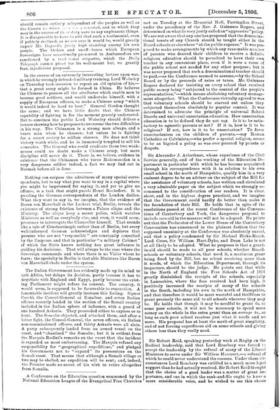Sir Alexander J. Arbuthnot, whose experience of the Civil Service
generally, and of the working of the Education De- partment in particular with which he has become acquainted. through his correspondence with it in relation to his own small school in the north of Hampshire, qualify him in a very eminent degree to be an adviser on the subject of the Bill for the assistance of voluntary schools, has written and circulated a very admirable paper on the subject which we strongly re- commend to the consideration of our readers. It is clear, short, and in the highest degree practical, and we imagine that the Government could hardly do better than make it the foundation of their Bill. He holds that in spite of the resolutions passed at the recent Conference of the Convoca- tions of Canterbury and York, the dangerous proposal to include rate-aid in the measure will not be adopted. He points out that the Prolocutor of the Lower House of the Canterbury Convocation has announced in the plainest fashion that the supposed unanimity at the Conference was absolutely unreal, and that a policy condemned by Sir Michael Hicks-Beach, Lord Cross, Sir William Hart-Dyke, and Dean Lake is not at all likely to be adopted. What he proposes is that a grant- in-aid should be made to all poor schools, whether Board- schools or voluntary schools, that need it, a maximum grant being fixed by the Bill, but no school receiving more than it needs, of which the Education Department, through its• inspectors, should be the judge. He points out that while in the North of England the Free Schools Act of 1891 greatly diminished the receipts of the schools, especially in Lancashire, where the fees received had been high, it positively increased the receipts of many of the schools in the South, including his own in the north of Hampshire, and that therefore it would be most wasteful and thriftless to grant precisely the same aid to all schools wherever they may be. He holds that though it may be needful to grant Cs. to some poor schools, it will not be necessary to spend more money on the whole in the extra grant than an average 4s., so long as each poor school receives just what it needs and no more. His proposal has at least the merit of great simplicity, and of not forcing superfluous aid on some schools and giving others less than they really need.






















































 Previous page
Previous page